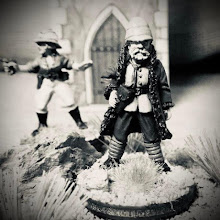 I've been adding some of the German forces that fought with Napoleon in Spain; now it is time to add some of the Germans that fought with the British. First up will be the Black Brunswickers followed by the King's German Legion. Perry Miniatures' line of the forces of Brunswick are some of the finest miniatures I have ever painted.
I've been adding some of the German forces that fought with Napoleon in Spain; now it is time to add some of the Germans that fought with the British. First up will be the Black Brunswickers followed by the King's German Legion. Perry Miniatures' line of the forces of Brunswick are some of the finest miniatures I have ever painted.The Black Brunswickers were a volunteer corps raised by German-born Frederick William, Duke of Brunswick-Wolfenbuttel (1771–1815) to fight in the Napoleonic Wars. The Duke was a harsh opponent of Napoloen's occupation of numerous German states. Formed in 1809 when war broke out between the French and Austria the corps initially comprised a mixed force, around 2300 strong, of infantry, cavalry and later supporting artillery.
Distinctively attired in black with a silvered death's head badge on their hats, the volunteers were nicknamed the Black Horde or the Black Legion; their more commonly-known title was the result of the Duke's temporary capture of the German city of Braunschweig (Brunswick) from the French in 1809. The Black Brunswickers earned themselves a fearsome reputation over the following decade, taking part in several significant battles including the pre-Waterloo engagement at Quatre Bras on 16 June 1815, where the Duke lost his life.
In 1806 the Duke's father, Charles Ferdinand, was fatally wounded during the Prussian defeat at the twin battles of Jena-Auerstadt. Following Prussia's defeat and the collapse of the Fourth Coalition against Napoleon, his duchy remained under French control. Rather than permit the Duke to succeed to his father's title, Napoleon seized the duchy and, in 1807, incorporated it into his newly-created model Kingdom of Westphalia ruled by his brother Jerome. Two years later in 1809 the Fifth Coalition against Napoleon was formed between the Austrian Empire and the United Kingdom. The dispossessed Frederick William, who had been a strenuous critic of French domination in Germany, seized this opportunity to seek Austrian help to raise an armed force. To finance this venture he mortgaged his principality in Oels. In its initial incarnation (dated to 25 July 1809), the 2300-strong 'free' corps consisted of two battalions of infantry, one Jager battalion, a company of sharpshooters, and a mixed cavalry contingent including Hussars and Uhlans (lancers).
Later that same year Frederick William led his "Schwarze Schar" (Black Horde) into Germany, and succeeded in briefly taking control of the city of Brunswick, earning his corps its epithet: the Black Brunswickers. He was soon driven out, but managed to flee with his troops to England where he joined his cousin and brother-in-law, the Prince-regent (later King George IV). During the next few years, the Brunswickers earned themselves a sound reputation through service with the British in the Peninsular War. However, steady attrition in battles and skirmishes through Portugal and Spain, combined with a lack of political support and financial difficulties, led to a situation where the unit's imminent disbandment looked likely.
Peninsular War
When organized for British service, the corps was renamed the Brunswick Oels Jägers and Brunswick Oels Hussar Regiments. Prussians represented a large part of the original officer corps, while the enlisted men were motivated by German patriotism. However, once the Oels entered English service, they were cut off from their natural recruiting grounds. Compelled to enlist men from the prisoner of war camps to fill up the ranks, the quality of soldiers in the Oels decreased. Worse, the King's German Legion obtained the best of the German recruits, leaving the Oels with the less desirable ones. In addition to Germans, the Oels recruited Poles, Swiss, Danes, Dutch, and Croats.
Nevertheless, the Brunswick Oels Jägers gave a good account of themselves during the war. The regiment—really a single battalion—arrived in Portugal in early 1811. The Duke of Wellington distributed one company to the 4th Division and two companies to the5th Division as skirmishers, while the remaining nine companies served in the newly-formed 7th Division. The Oels remained in this organization until the end of the war in April 1814. During this period, the Oels served in most of the major battles including Fuentes de Onoro, Salamanca, Vitoria, the Pyranees, Nivelle, the Nive and Othez.



I've got a couple of bases of Brunswickers for my British Grand Armee force (as well as KGL and Hanoverians).
ReplyDeleteGermans for the win!